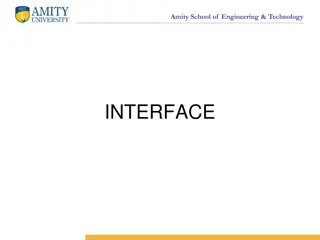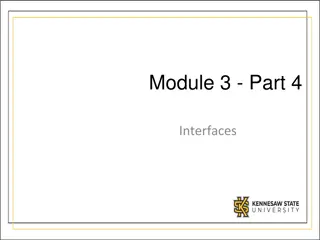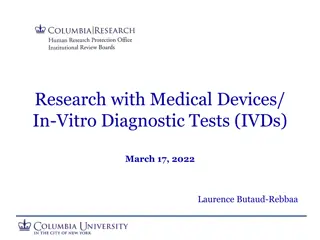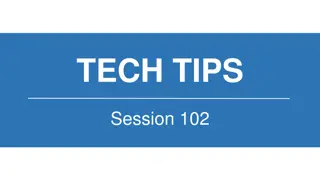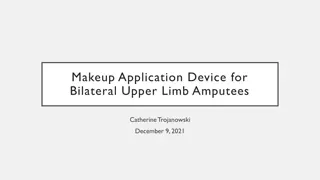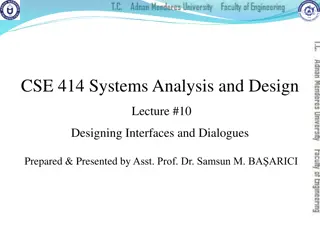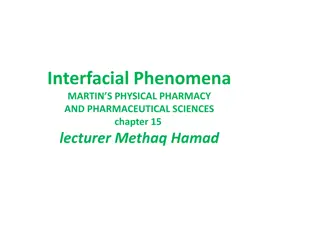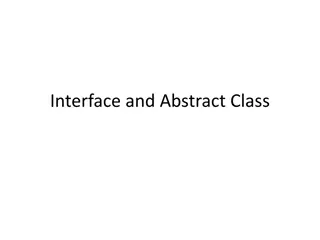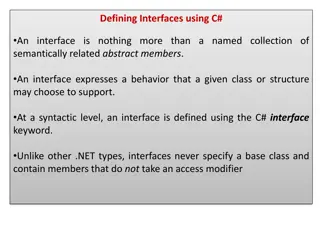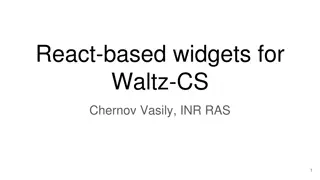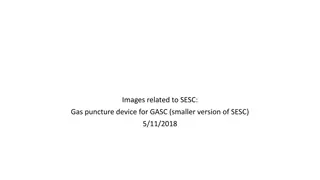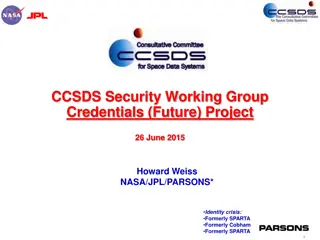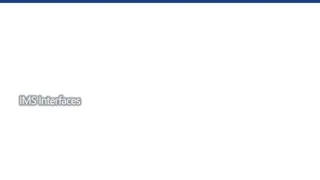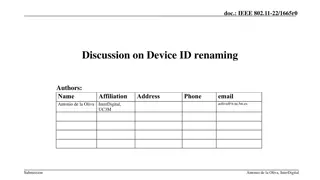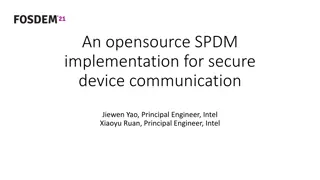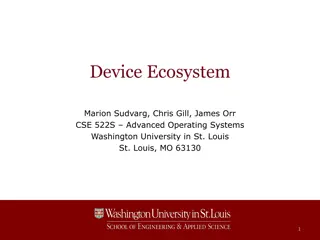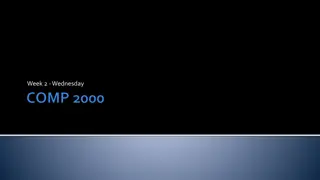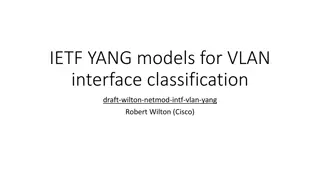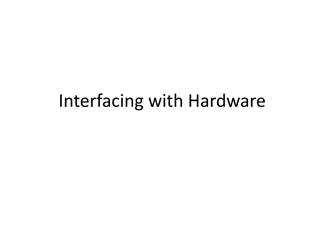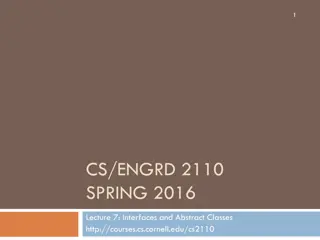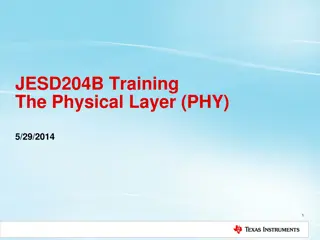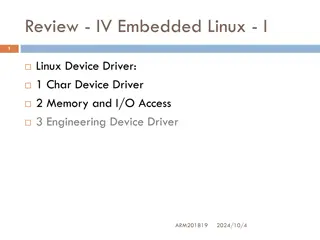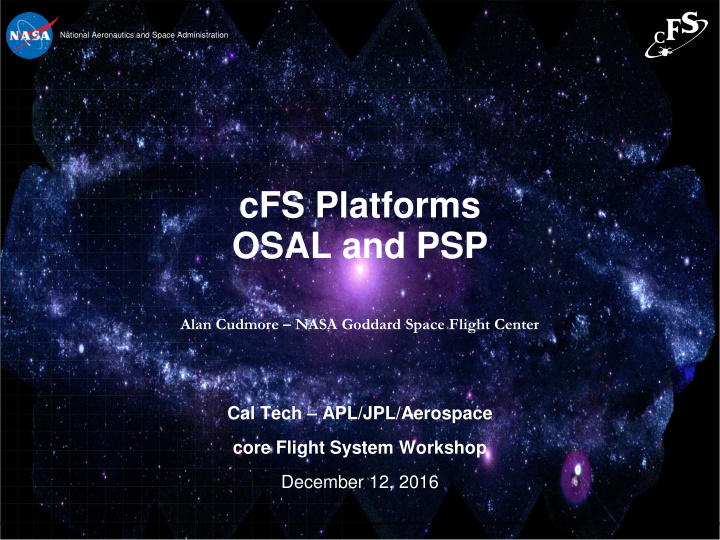
Brief History of OSAL and PSP in Aerospace Technology
Explore the evolution of the Operating System Abstraction Layer (OSAL) and Platform Support Package (PSP), essential components in developing flight software for different operating systems and hardware platforms in the aerospace industry.
Download Presentation

Please find below an Image/Link to download the presentation.
The content on the website is provided AS IS for your information and personal use only. It may not be sold, licensed, or shared on other websites without obtaining consent from the author. If you encounter any issues during the download, it is possible that the publisher has removed the file from their server.
You are allowed to download the files provided on this website for personal or commercial use, subject to the condition that they are used lawfully. All files are the property of their respective owners.
The content on the website is provided AS IS for your information and personal use only. It may not be sold, licensed, or shared on other websites without obtaining consent from the author.
E N D
Presentation Transcript
National Aeronautics and Space Administration National Aeronautics and Space Administration cFS Platforms OSAL and PSP Alan Cudmore NASA Goddard Space Flight Center Cal Tech APL/JPL/Aerospace core Flight System Workshop December 12, 2016 1
Agenda Brief history of the OSAL and PSP Anatomy of a Device Driver Current PSP Interfaces Future PSP device interfaces - cFS Library based device interfaces - PSP Plugin device interfaces Other PSP Needs - Porting Guide and Documentation - Test Suite 2
Brief History of the OSAL & PSP The Operating System Abstraction layer (OSAL) is a small software library that isolates an application from a supported Real Time Operating System With the OSAL, flight software such as the core Flight System can be compiled for different operating systems without modifying the source Currently the OSAL does is a standalone project and does depend on the cFE or cFS OS function to create a new task OS_TaskCreate rtems_task_create rtems_task_start taskSpawn pthread_create Implementation for vxWorks Implementation for RTEMS Implementation for POSIX ( linux, mac os X, etc.. ) 3
Brief History of the OSAL & PSP The Platform Support Package (PSP) is a software library that adapts the cFE Core and cFS applications to a specific hardware and operating system platform* The PSP was derived from the BSP and HAL directories in the original OSAL. It was named PSP to avoid confusion with an operating system BSP (vxWorks) The PSP covers the minimum number of APIs to get the cFE/cFS running on a processor with an OS. The PSP is currently a cFE/cFS specific library *Some platforms such as linux may be more generic, allowing a PSP to support more than one hardware platform. 4
Brief History of the OSAL & PSP The first version of the OSAL was created for the SDO mission. - SDO has a RAD750 running vxWorks and multiple Coldfire CPUs running RTEMS - SDO pre-dated cFE/cFS OSAL and the Hardware Abstraction Layer - The OSAL originally had a hardware abstraction layer (HAL) covering much of what the PSP does now - Problem: As we developed the cFE, users asked for new versions of the OSAL to support new hardware platforms. It did not make sense to deliver a new version of the OSAL to support a new processor card. - To make the releases more stable and modular, the HAL was forked to the cFE Platform Support Package (PSP) Now the purpose of the OSAL is to cover just the operating system interfaces The PSP became the glue logic that ties the cFE/cFS to a Processor Platform & OS 5
Anatomy of a Device Driver A device driver can take a few different forms - Small microcontroller based drivers Usually Memory Mapped or I/O based device Can have interrupt and/or DMA support Example: Send data on the I2C bus on the Dellingr/Nanomind CPU int i2c_send(int handle, i2c_frame_t * frame, uint16_t timeout); Unix style device drivers o - In a POSIX style kernel, drivers live in kernel space and the user interacts through a standard open/close/read/write/ioctl API Some Real Time Operating Systems support both types of drivers - Open/close/.. API is used even though there is no user/kernel space barrier 6
Current PSP Device Interfaces The PSP just covers the necessary interfaces to allow the cFS to run on a particular hardware platform with a particular OS - Example: RAD750 3U board with vxWorks 6.x Current PSP interfaces / functions include - Startup and Restart APIs How do we startup the cFE? How does the cFE command a restart of the board? - Memory access APIs EEPROM / Nonvolatile memory Special access for RAM Memory copy utilites ( abstracted to support different memory interfaces ) Device I/O APIs - - Compiler definitions and switches 7
Future PSP Device Interfaces It will be hard to keep expanding the PSP API to support a growing collection of drivers for cFS applications - For example: Do we want to add the API for Bob s super GPS & Gyro module if it will only be used on one platform? - The API would continue to expand (and contract) based on the hardware being supported - We also don t want to back port new APIs to old PSPs or have a bunch of empty APIs for unsupported devices on each platform Based on that thought, a couple of options: - cFS mission hardware libraries - PSP device plugin model - Or, a hybrid approach using both as needed 8
Mission Hardware Library Option cFS Reuse App Mission App cFE/cFS Mission Hardware Library ( All Mission hardware accessed through this library) core Flight Executive (cFE) Platform Support Package OS Abstraction Layer Real Time Operating System RTOS Board Support, File Systems, Drivers, Firmware Libraries, etc Legend: Vendor Supplied Processor , Memory, Peripherals, and other hardware cFE/cFS Reuse New on Dellingr 9
Mission Hardware Library Option Mission Hardware Library - Pros Allows app developers more flexibility in adding and modifying mission specific hardware Library APIs can use services such as OSAL Tasks if needed Library APIs can use underlying OS, BSP, or firmware if needed Easy to incorporate simulator at this level Cons - This model breaks the layering by introducing hardware specific code at the app layer ( but at least the apps stay generic ) An implementation for each platform/OS has to be made This model was used for the Dellingr Cubesat, and has worked very well - Two implementations of the Dellingr Hardware Library (DHL) Linux with simulated hardware and interface to the 42 Dynamic Simulator Gomspace Nanomind with actual hardware/firmware calls o o 10
PSP Plug-in Device Model cFS Reuse App Mission App cFE/cFS PSP Device Plugin Calls Mission Hardware Library (Code can generic APIs below) core Flight Executive (cFE) Plug- in Plug- in Plug -in Platform Support Package OS Abstraction Layer Real Time Operating System RTOS Board Support, File Systems, Drivers, Firmware Libraries, etc Legend: Vendor Supplied Processor , Memory, Peripherals, and other hardware cFE/cFS Reuse New on Dellingr 11
PSP vs. Library based drivers PSP Plug-in Option PSP Plug-in model - Create a device driver model that is generic enough to support underlying layers from FreeRTOS to RTEMS - Devices do not have to be portable to all platforms and Operating Systems - Create a standard API to add or remove a device - Use a standard API to init/open and use a device 12
PSP vs. Library based drivers Hybrid approach cFS Reuse App Mission App cFE/cFS Common Sensor Library (GPS, Gyro, Temp, etc ) Mission Hardware Library ( All Mission hardware accessed through this library) core Flight Executive (cFE) Plug- in Plug-in Platform Support Package OS Abstraction Layer Real Time Operating System RTOS Board Support, File Systems, Drivers, Firmware Libraries, etc Legend: Vendor Supplied Processor , Memory, Peripherals, and other hardware cFE/cFS Reuse New on Dellingr 13
PSP vs. Library based drivers Hybrid approach PSP Hybrid approach - PSP Device Plugins - cFS Mission Hardware Libraries Can include Mission Specific Libraries or more portable libraries such as Common Sensor Libraries ( for Sensor/Actuators ) Simulator Interface Libraries Etc o o o 14

